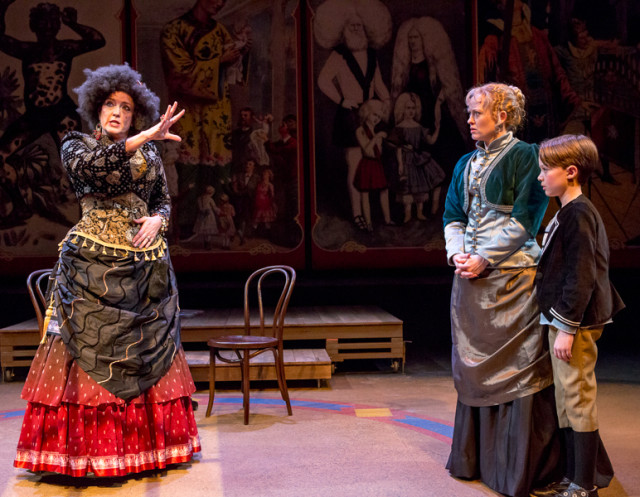Reviews: "A Noble Failure" & "The Lost Boy"
Playing at Artists Repertory Theatre, The Lost Boy, the winner of the 2009 Oregon Book Award, tells the historic tale of the kidnapping of Charley Ross in 1874, believed to be the first ransom kidnapping and the first to become a national sensation. With the help of none other than P.T. Barnum, a small personal story—how a couple deals with a missing child—grows into a national circus, and individual struggles balloon into national ramifications.
A Noble Failure, staged by Third Rail Repertory Theatre, works in the opposite direction. Mach takes a complex current national issue, education reform, and microscopes it onto several individuals in a single school, giving human life to an otherwise immensely faceless issue.
(For more background on the two plays and Mach, read our profile).
To be frank, I was looking forward to the carnival narrative of Boy and was very skeptical of the issue-oriented Failure. But instead, Failure ended up the richer, funnier, and more compelling of the two, while Boy languished from slow pacing and predictability.

The principal (Bruce Burkhartsmeier) berates Ivan (Gavin Hoffman) as his teacher, Rosalyn (Jacklyn Maddux), watches on. Photo by Owen Carey
A Noble Failure is a portrait of a modern-day high school school in transition. While the principal and one of the senior teachers, Rosalyn, deal with old school problems like the graffiti of rebellious student Ivan, they’re also confronted by new school issues: a consultant and a lawyer hired by the state to coach teachers to raise their students’ test scores and to collect evidence to prove that the teachers are doing their jobs, respectively. As the new and the old collide, the story begins to take on Orwellian notes that are all the more frightening because this is not some far-off dystopia; these changes are happening in our schools today.
While there’s nothing like advocacy art to send a preliminary shiver up one’s spine, A Noble Failure succeeds by all theatrical measures: empathetic, deeply rounded characters; bitingly witty, authentic dialogue; taut narrative arc spurred by multiple levels of conflict; smart direction and staging by director Philip Cuomo that recreates the spirit of a school (though I wish Portland theaters would can the canned music). But more so, it achieves a grander goal: the expression and transmission of deeper cultural ideas and meanings. In this case, those ideas and meanings just happen to revolve around the complex national battle for the future of our schools, and Failure breathes life into all sides while also stirring outrage in the tradition of the most potent Agitprop.
Bruce Burkhartsmeier and Jacklyn Maddux are exceptional as the principal and Rosalyn—each of Burkhartsmeier’s facial ticks and finger wags communicating a treatise of churlishness, while Maddux captures that slightly batty English teacher we all loved for her passion and deep-down steely soul. Both characters are idealists who have been slowly beaten down by the endless tightening of belts, yet their former hope still occasionally breaks through their beleaguered cracks, particularly as they take a stance against the corporate interlopers sent to right their ship. "How would James Joyce fare on a state writing assessment?" Rosalyn fires back.
A Noble Failure runs at the Winningstad Theatre through February 3.If the play has a weakness, it is in the portrayal of the consultant, played by Maureen Porter with grinning corporate slickness, and the inability of the two sides to communicate. While Porter does an able job portraying her as well meaning, the character is still a little too much of an ideological stand in, her own motivations a little tenuous while she is unable to sympathize with or even hear the resistance of those she would replace, which is met by an equally obtuse inability on Rosalyn’s part to understand what her interrogators want to hear. Nonetheless, the play allows the audience to fully inhabit the teachers and, to a lesser agree, the motivation of the reform movement, making art that is achingly funny, entertaining, relevant, and thought-provoking from public policy—certainly that’s gold star worthy.

The psychic Zalumma (Luisa Sermol) tells Sarah Ross (Dana Millican) that she has seen her missing son Charley. Photo by Owen Carey
The Lost Boy, on the other hand, starts with a natural page-turner of a story. After watching the kidnapping case of Miranda Gaddis and Ashley Pond unfold, Mach wanted to explore the issues of losing a child and the concomitant exploitation of the family by the media and others. After learning of the Charley Ross case, she knew she’d found her story—one she could imagine from the point of view of the family, the kidnappers, and from those who profited from the tragedy: newspaper editors, P.T. Barnum, and a group of circus hucksters.
The Lost Boy has all the ingredients for a stellar piece of theater, and indeed shows some great creativity under the directorial hand of Allen Nause in its use of the carnival players as stagehands and headline barkers. But the kidnapping trope is a well-worn one, and with the exception of the final scene, the play fails to stray far from the beaten path, leaving its characters mostly one-sided and predictable, which is all the more glaring for the depth of Failure’s characters.
The parents in particular feel like they come from an after-school special, at turns blaming themselves and each other as they increasingly lose hope, which wears on, as Michael Fisher-Welsh and Dana Millican lack strong chemistry.
Meanwhile, the kidnapper duo firmly inhabits the bad guy cliché of the insidious mastermind and the bumbling but sympathetic henchman (I left with the Pinky and the Brain theme song in my head), despite strong performances by Duffy Epstein and Sean Doran. And while the idea of the carnies as being representatives of the wider American culture is interesting, it's mostly undeveloped, leaving them as barely more than colorful distractions, although Luisa Sermol is delightful as the psychic Zalumma Agra.
It’s a production that has not hit its stride and a play that struggles with the rhythm of its tone. Advertised in the program as one hour and 40 minutes, opening night actually ran two and a half hours. No doubt it will tighten with time, but, in my mind, it could have lost a number of scenes without losing the impact (in fact, I could have done without the textbook kidnappers at all, leaving the audience just as in the dark as the parents and their social profiteers). At heart is a dissonant contrast between the seriousness of the family scenes and the light and humorous interstitial circus scenes. Whereas Failure captures comedy and pathos in the same line, Boy feels more like you’re watching two plays in two different circus rings that haven’t yet figured out how to merge under the same big top, although they grow closer in the second act.
The Lost Boy runs at Artists Repertory Theatre through February 10.Which isn’t to say there aren’t strengths. Agatha Day Olson and Harper Lea give incredibly authentic and energetic performances as Charley and his older brother, Walter. Indeed, the show’s most haunting moments come as a silent Charley walks through the set in ghostly lighting. And the character of Barnum, played by Gray Eubank (a late addition after Todd Van Voris was injured), introduces the most depth and ambiguity to the play, coming out the only real winner in an ending that provides by far the most troubling and provocative moment, hinting at what the play could be if some of the sideshows were cut to focus on truly fleshing out the key acts.




